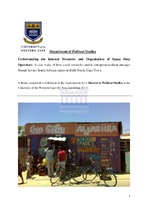Understanding the internal dynamics and organisation of Spaza shop operators
Abstract
This thesis presents a study of spaza shop businesses in the Delft South township, Cape Town, South Africa. The major goal is to establish whether the advent of foreign run spaza businesses is due to a particular ‘entrepreneurial’ business model underwritten by relatively strong social networks. The study focuses primarily on South African and Somali owned spaza shops as previous research indicates that these are the two major groups of spaza operators in the area. The thesis centres on three core research questions: 1) is there a shift in spaza ownership from South African to Somali shopkeepers in Delft? 2) What are the different spaza business models in operation? 3) What is the significance of social networks or relationships to the success of these business models? The core findings confirm that a major shift has occurred in market share between South African and foreign owned spazas in Delft, with ownership now favouring Somali businessmen, even within the last year. The research shows that this change in ownership is a direct result of the emergence and use of a new, and more sophisticated, ‘entrepreneurial’
business model employed by foreign spaza operators, compared to the more ‘survivalist’ model used by South Africans. This business model is primarily based upon being price competitive and is made possible through collective procurement and distribution. However, an important factor in this success lies in the differential social networks that South African and Somali spaza owners can access to support their business practices in Delft South. Using an anthropologically influenced in-depth ethnographic case study approach, the research operationalises the concept of ‘business models’ by exploring the establishment process (ownership, labour and employment), capital investment, stock procurement, business
operation and mobile distribution to spaza shops. The study demonstrates how the socially richer and clan-based social networks of Somali shopkeepers enable a more entrepreneurial business model, whereas South Africans rely on a network limited to the immediate family and approach the spaza business as a supplementary livelihoods strategy. In addition to deepening our understanding of competing business models and the social networks that underwrite them,
this research also provides new insights into the significance of spatiality to the spaza economy through the concepts of ‘strongholds’ and ‘neighbourhood economies’; previously unseen forms of spaza related business, principally around the mobile distribution of spaza stock to retailers in Delft South; and the instrumental use of both formality and informality by foreign business people.

